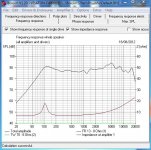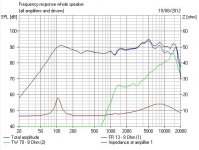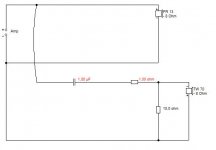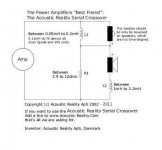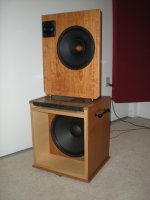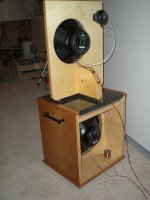The real answer to your question is that a fullrange driver isn't 8 ohms resistive. It is much more complex than that. Generally it is 6 ohms DC plus a 0.2-0.4mH inductance. You also notice the bass resonance in a cabinet electrically. This gives you a frequency dependent plot for a 5" whizzer coned Visaton FR13 thus:
A parallel crossover and efficient wallmounting bookshelf style seems indicated here, though adding a tweeter to a fullrange is very rough and ready unless you really do some crossover work tailoring response. Most people just add a notch to tame the typical 5kHz peak at crossover between the bass and whizzer and forget about the tweeter.
Series crossovers are very different animals. The simplest is the AR-SXO which has low impedance due to the resistor across the bass, and is also kinda rough and ready. FWIW, better designs are to be found here:
http://www.diyaudio.com/forums/multi-way/206843-sreten-speakerman-go-series-xos-56.html#post3046046
An externally hosted image should be here but it was not working when we last tested it.
A parallel crossover and efficient wallmounting bookshelf style seems indicated here, though adding a tweeter to a fullrange is very rough and ready unless you really do some crossover work tailoring response. Most people just add a notch to tame the typical 5kHz peak at crossover between the bass and whizzer and forget about the tweeter.
Series crossovers are very different animals. The simplest is the AR-SXO which has low impedance due to the resistor across the bass, and is also kinda rough and ready. FWIW, better designs are to be found here:
http://www.diyaudio.com/forums/multi-way/206843-sreten-speakerman-go-series-xos-56.html#post3046046
Attachments
OK, let me see if I have this right:
1. The cap on the tweeter, when wired in parallel only effected the tweeter, but when wired in series, the cap effected the 12LTA driver as well which accentuated the high end even more. When I started to add resistance to the tweeter, the resistors also affected the full ranger and totally screwed with everything.
2. The 8 ohm tweeter (with series 1uF cap) wired in parallel with the 8 ohm full range, really doesn't present a 4 ohm load to the amp except in the range the two drivers overlap.
Sounds like you've got it yep 🙂
Additionally, you see in the graph system 7 just posted that the woofer impedance (this applies to any woofer really) rises towards the top end, owing to voice coil inductance. Hence, where your tweeter is active (filter break is nearly 20kHz with 1uF!) the woofer impedance is much higher than 8 Ohms anyhow, in fact the datasheet shows your woofer as having 60 Ohm impedance at 20kHz! Hence the combined load is a rather benign 7 Ohms.
What am I doing wrong? Any help is appreciated., thanks.
Your problem is that you're using a 12" full range.
Basically you've got a few choices
Scenario 1) Cross the tweeter around 300hz as a mid-tweeter.
Scenario 2) Cross the tweeter 4th order or higher around 10khz only as a super-tweeter to remove its contribution lower in frequency.
Any other scenario will lead to a very bad mismatch of reflected sound power.
With scenario 2, you'll still have to deal with various distortions from using the 12" driver beyond its pistonic range. I wouldn't use 12" drivers above 1khz as they tend to start breaking up around 2khz. Even paper will break up.
With Scenario 1 you will run into issues with most tweeters as they don't want to play that low.
Ultimately, your insistence to avoid crossovers will hold you back
Many thanks to everyone here as your feedback really has helped me. At the end of the day it really is all about the music for me and not the relentless pursuit of every last degree of improvement.
I have moved from OEM speakers to MLTL 8" single driver DIY speakers then to 8" OB speakers with helper woofers in several designs. I have tried these 12" drivers in OB and just love their huge soundstage and lifelike presentation. The addition of the tweeter (super tweeter with Cap) has added a level of complexity that I needed to learn more about. Again, many thanks to all for getting me through it.
Here are a couple pictures of my speakers (the ideas to try these specific drivers came from the help of a couple of guys here and other sites):
I have moved from OEM speakers to MLTL 8" single driver DIY speakers then to 8" OB speakers with helper woofers in several designs. I have tried these 12" drivers in OB and just love their huge soundstage and lifelike presentation. The addition of the tweeter (super tweeter with Cap) has added a level of complexity that I needed to learn more about. Again, many thanks to all for getting me through it.
Here are a couple pictures of my speakers (the ideas to try these specific drivers came from the help of a couple of guys here and other sites):
Attachments
Last edited:
Here are a couple pictures of my speakers (the ideas to try these specific drivers came from the help of a couple of guys here and other sites):
The craftsmanship of the enclosure and flat baffle is great.
What I'm curious about is the partial enclosure for the woofer closest to the floor. It would seem that the four panels around the woofer extending in front and behind might result in resonance from those enclosed areas acting like short pipes. If there is some additional resonance from that structure, perhaps it is very minimal, but I would think that it might distort the frequency response somewhat.
Regards,
Pete
Love the woodwork and craftmanship
Just one comment.
Does mounting the cap in line add any resonance?
Most of us secure the cap to a non resonant portion of the box if we can, supposed to stop "Microphony" effects with-in the cap.
Just one comment.
Does mounting the cap in line add any resonance?
Most of us secure the cap to a non resonant portion of the box if we can, supposed to stop "Microphony" effects with-in the cap.
Wow! Yes - kudos on the woodwork. Very nice.
I see that you live in an older house, like me, with 2 prong outlets. Kind of a pain.
This driver on OB sounds more like an electrostatic speaker than a cone driver, but with cone dynamics. It's very surprising.
I see that you live in an older house, like me, with 2 prong outlets. Kind of a pain.
From this I can deduce that you have never heard the Beta 12 LTA. It's usable all the way up, and stellar up to about 6K. Crossover above that is tricky (if you want a really good crossover) because of the whizzer response.I wouldn't use 12" drivers above 1khz as they tend to start breaking up around 2khz. Even paper will break up.
This driver on OB sounds more like an electrostatic speaker than a cone driver, but with cone dynamics. It's very surprising.
Many thanks for the feedback on the woodwork, it's my second hobby. I'm trying to learn as much about audio as I have furniture building.
MCPete: The design of the H frame came from Martin J. King, so I have trusted his design. I made the cabinet from 1" Baltic birch plywood and all the joints are either dado or rabbit for added strength.
Moondog55: I'll take a look at how I have the cap mounted, frankly, it never occurred to me to consider the point you raised, thanks.
Pano: It sounds like you have experience with the Beta 12LTA, is that true? Your comments about the driver are very accurate, what a sleeper it is. Not the last word in detail, but that's OK as we trade off for sound stage, presentation and impact. Incidentally... I have 3 prong plugs in the house, but I think you may be spotting the plug adapter in use in one of my pictures? I use that to resolve a ground loop coming from my plate amps. They generate a nice hum through the drivers, that adapter removes it completely.
Thanks again for the feedback and the education.
MCPete: The design of the H frame came from Martin J. King, so I have trusted his design. I made the cabinet from 1" Baltic birch plywood and all the joints are either dado or rabbit for added strength.
Moondog55: I'll take a look at how I have the cap mounted, frankly, it never occurred to me to consider the point you raised, thanks.
Pano: It sounds like you have experience with the Beta 12LTA, is that true? Your comments about the driver are very accurate, what a sleeper it is. Not the last word in detail, but that's OK as we trade off for sound stage, presentation and impact. Incidentally... I have 3 prong plugs in the house, but I think you may be spotting the plug adapter in use in one of my pictures? I use that to resolve a ground loop coming from my plate amps. They generate a nice hum through the drivers, that adapter removes it completely.
Thanks again for the feedback and the education.
I hope not. If you do, none of the rest of us stand a chance. 😀Many thanks for the feedback on the woodwork, it's my second hobby. I'm trying to learn as much about audio as I have furniture building.
A little, yes - thanks to my buddy John B. It is a surprising driver, as is the Beta 8.Pano: It sounds like you have experience with the Beta 12LTA, is that true?
When crossed properly to a tweeter the detail will be there. Not an easy task, tho.Not the last word in detail, but that's OK as we trade off for sound stage, presentation and impact.
Yep, I have so many I tend to spot them right away. They work well as ground lifts, for sure.I have 3 prong plugs in the house, but I think you may be spotting the plug adapter in use in one of my pictures?
- Status
- Not open for further replies.
- Home
- Loudspeakers
- Multi-Way
- Tweeter too bright regardless of what I try
